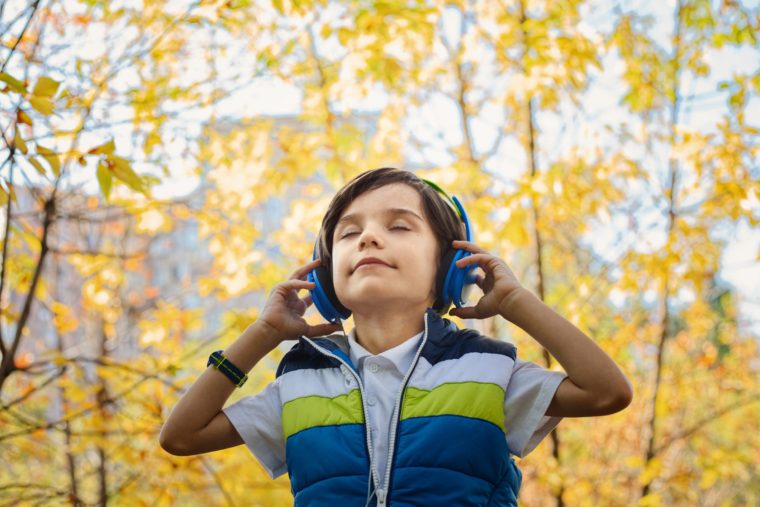We learn language by hearing it even before the moment of birth.

In fact, after your child’s language has fully developed, he continues to learn new words and new ways of expressing ideas. This learning happens largely through his sense of hearing.
What is auditory identification?
Auditory identification is the third stage in the hierarchy of auditory skill development. It is the ability to attach meaning to and manipulate sounds, thereby labeling by repeating, writing, or pointing to a picture or text.
At this stage, your child not only is aware of your voice, discriminates between things that are the same or different, but begins to understand exactly what he is hearing.
When your child has mastered auditory identification, he attaches meaning to a sound by identifying what object is making the sound or attaches a word to a picture/object. Given a verbal label, your child will be able to select the correct picture from an array of pictures.
Auditory identification includes:
- Auditory association – the ability to attach meaning to sounds and speech.
- Auditory feedback/Self-monitoring – the ability to change speech production based on information you get from hearing yourself speak.
- Phonological Awareness (Auditory Analysis) – the ability to identify, blend, segment, and manipulate oral language structure
Why is auditory identification important for learning?
Auditory identification is one of the speech perception skills that’s essential for communicating by spoken language. It is one of the starting blocks for learning to read.
This is one of the skills that determine your child’s listening success.
Most children without hearing loss will develop all but the most complex listening skills by the time they are ready to begin school. This improves their ability to listen in noise as their brain matures – until age 13-15 years.
How can you tell if your child has trouble with auditory identification?
A child who has trouble with auditory identification may have difficulty:
- Labeling common items,
- Finding objects you’ve named
- Difficulty identifying rhyming words
His challenge could show up in one or more of the subcategories mentioned in the definition section above.
How can you help your child develop auditory identification skills?
Here are some games you can play with your child to develop this skill:
- Place 3 of your child’s favorite toys on the floor, then ask him to give you one when you name it. Increase the number of toys to raise the level of difficulty.
- Teach your child some action songs. Once he has learned them, begin singing one without making any motions. Notice if he does the actions by himself.
- Have your child lay out his clothes for going out, then ask him to give you a specific item of clothing.
- Play sound Bingo
- Play recorded sounds (environmental, animal, common objects, etc.) and have your child identify the sound.
- For older children, play “description games” and have your child supply the name of what you describe.
- For example, “I’m thinking of something that is red. It’s a fragrant flower that grows on a bush. Its stem has thorns on it. People give them for Valentine’s Day.”
Hearing connects us to our world…to small everyday wonders and to the people and experiences we love. Being able to attach meaning to the sounds and words your child hears will make his life much more enjoyable.
What other games or activities would you suggest to help a child develop his auditory identification skill?

This is a really complete list of suggestions. One thing that I would add would be something that really helped me… singing. I found that I could understand more by singing and by hearing people sing things like rhyming words by setting them to music. You will probably find that a number of kids learn language better through music.
Yes, Alice, singing does help with all areas of auditory processing. Music has been shown to activate all areas of the brain and it wakes up the ear. I use music listening therapy in my speech therapy sessions. Thanks for mentioning it.
Hi Florence,
I am still learning words. Some are for my ongoing challenge to learn more of the French language. Maybe some of your games would help me.
It makes sense that the more we hear and speak the words the more words we will learn and the better our pronunciation will be. Hearing is needed for both of those.
Hearing is foundational for learning. It is the first body system to develop in the fetus. I learned French in high school. Much of that is gone now since I have not practiced it much. Happy learning!
This is very interesting, Florence. I have wondered how dogs learn our words. I imagine that it must be a clean slate at first as in babies before they associate sounds with meaning.
I believe the same as you, Lily. Fascinating, isn’t it?
This is quite interesting. My daughter was just diagnosed with dyslexia within the last year, so I am learning so much. This was helpful. Thank you!
Welcome to my blog. My daughter was identified as dyslexic when she was in the 2nd grade. Back then, even though I worked as a speech-language pathologist in a school, I didn’t know much about it, except that we were both frustrated and overwhelmed at the end of every weekday. That prompted me to research ways to help her at home since her school did not know what to do.
Today, I’m passionate about sharing what I learned and pray that, through the knowledge, tips, and strategies I share, other moms do not have to endure the feeling of helplessness or be riddled with fear about the future of their brilliant children who learn differently from how schools deliver instruction.
Be encouraged, April. There’s light at the end of the academic tunnel. 😊